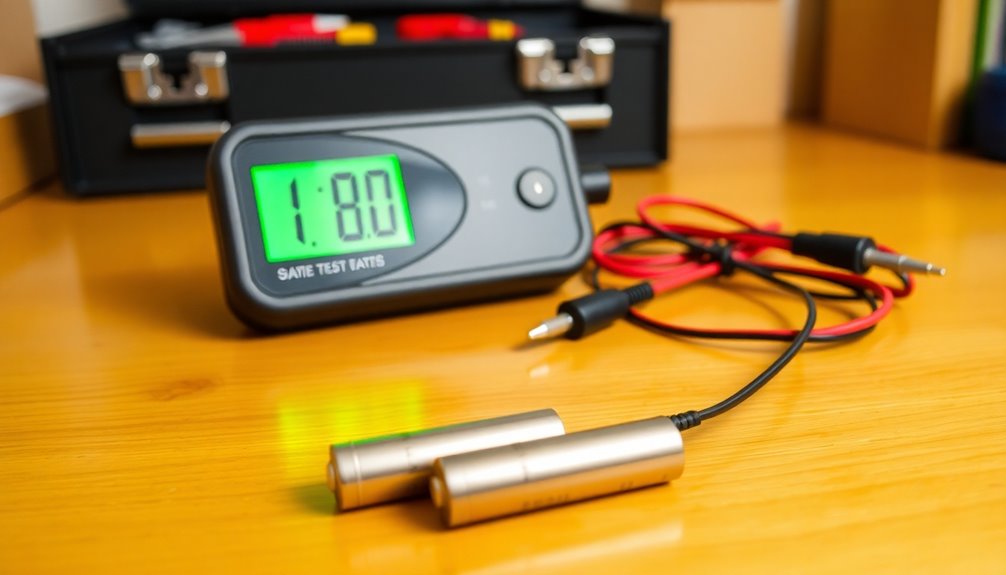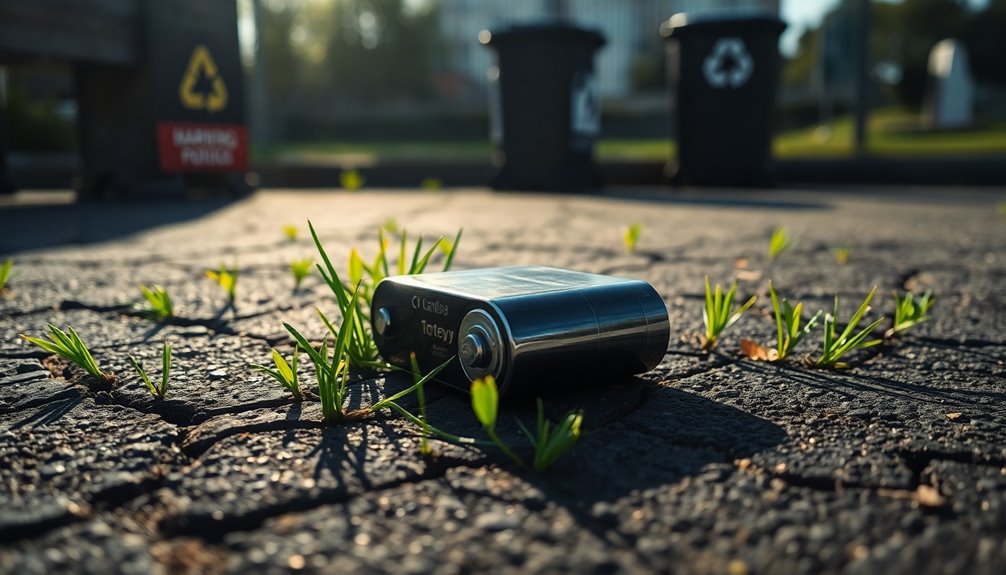Car batteries typically need replacement every 3 to 5 years, but with proper maintenance, you can extend their life. Regularly check your battery fluid levels and clean the terminals to prevent corrosion. Inspect cables for wear and verify all connections are tight. Pay attention to signs like slow engine cranks or dim headlights, which indicate potential issues. Extreme temperatures can also affect performance, so consider where you park. Finally, it's wise to schedule annual professional checks for early problem detection. There's plenty more you can learn about keeping your battery in top shape.
Key Takeaways
- Car batteries typically need replacement every 3 to 5 years, depending on usage and environmental conditions.
- Regularly check battery fluid levels and clean terminals to prevent corrosion and improve efficiency.
- Conduct routine voltage tests every six months to monitor battery health and catch issues early.
- Signs of battery issues include slow engine cranks, dim headlights, and corrosion buildup around terminals.
- Schedule annual professional battery health checks for expert assessment and to extend battery life.
Importance of Battery Maintenance
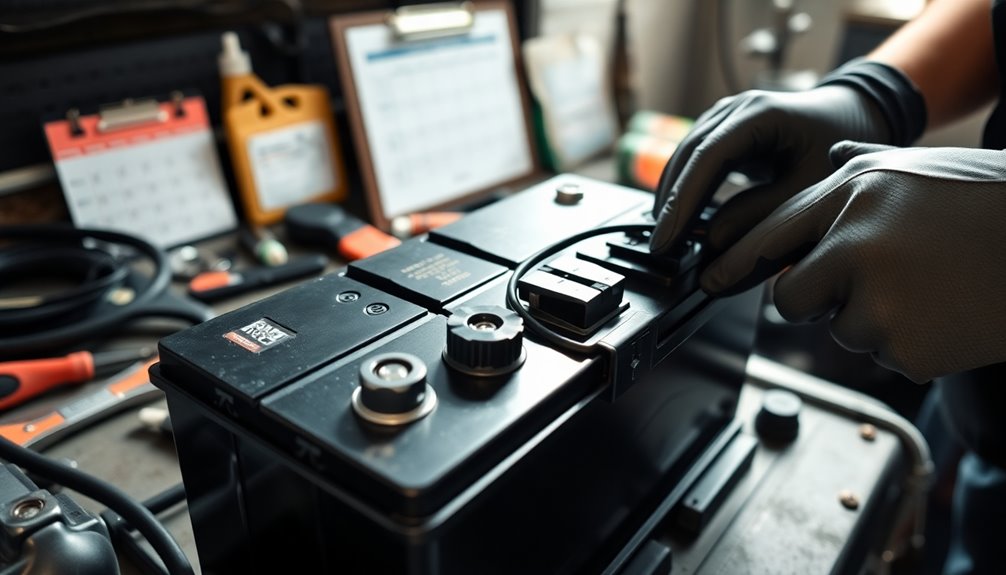
Battery maintenance is essential for keeping your vehicle running smoothly and extending the life of your battery, which usually lasts between 3 to 5 years.
Regularly cleaning battery terminals prevents corrosion, improving charging efficiency and reducing resistance in your electrical system. You should also monitor fluid levels in non-maintenance-free batteries, topping them up with distilled water to maintain electrolyte balance.
Conduct routine inspections and test battery voltage every six months to catch potential issues early, helping you prevent unexpected breakdowns.
Make certain to secure the battery properly and check for wear on cables to avoid damage caused by vibrations.
Routine Maintenance Practices

To keep your vehicle's electrical system running efficiently, it's crucial to adopt routine maintenance practices for your battery.
Start by checking battery fluid levels every six months for non-maintenance-free batteries, and top up with distilled water as needed.
Make it a habit to clean battery terminals using a baking soda and water mixture to prevent corrosion and improve charging efficiency.
Don't forget to inspect cables for wear and verify all connections are tight to maintain peak performance.
Conduct routine voltage tests with a multimeter every six months to verify the battery's ability to hold a charge.
Finally, schedule annual professional battery health checks to catch any early issues and maintain your battery's longevity.
Signs of Battery Issues
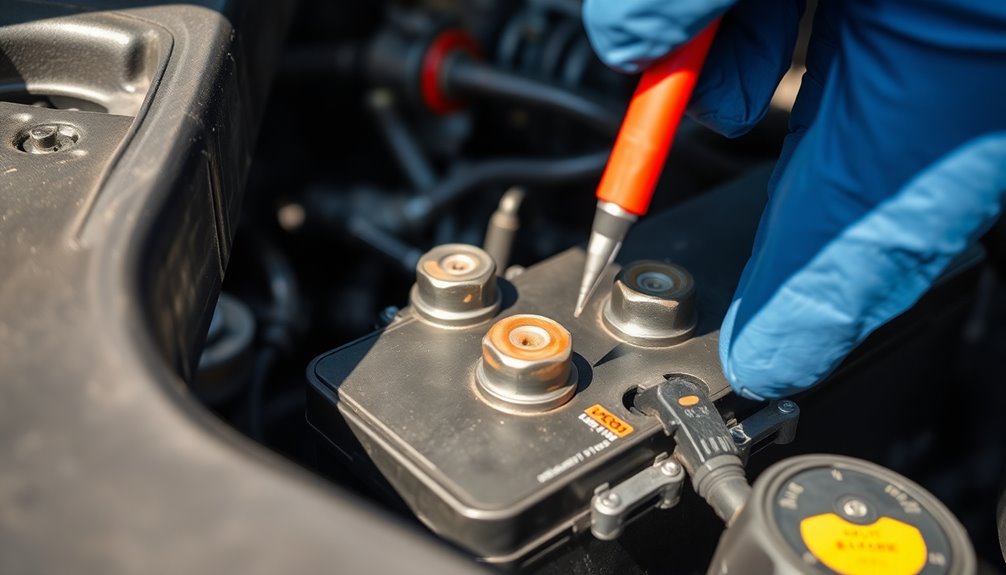
When your vehicle starts showing signs of struggle, like a slow engine crank or dimming lights, it's time to pay attention to potential battery issues. Ignoring these could lead to unexpected breakdowns.
Here are some key signs of a failing battery:
- Slow engine crank: A noticeable delay when starting indicates weakening battery power.
- Dim headlights: Reduced brightness suggests insufficient voltage is being supplied.
- Battery warning light: If this light activates, it's essential to inspect the battery or charging system.
- Corrosion: Buildup around battery terminals can hinder the electrical system's performance.
If you notice a swollen battery case, replace your car battery immediately to prevent further hazards.
Regular battery maintenance can help avoid these issues.
Environmental Effects on Batteries

As temperatures fluctuate, your car battery's performance can be greatly affected. Extreme temperatures, whether cold or hot, can markedly impact battery performance.
Cold weather reduces battery capacity, while hot weather accelerates fluid evaporation. High humidity levels can also promote corrosion on battery terminals, leading to decreased efficiency and potential failures.
To combat these effects, consider parking in shaded areas during hot weather to maintain a stable battery temperature and reduce heat stress, which helps prolong battery lifespan.
Also, avoid short driving trips, as they prevent the battery from fully recharging.
In cold climates, using insulating blankets can help retain heat and improve starting power during frigid conditions, ensuring your battery runs smoothly all year round.
Professional Services for Batteries

When your car battery needs attention, professional services can make your life easier with mobile battery testing right at your location.
You'll benefit from expert installation, ensuring your new battery is set up correctly and safely.
Plus, they handle the disposal of your old battery, keeping everything eco-friendly and compliant with regulations.
Mobile Battery Testing
How can you guarantee your car battery remains in top shape? Consider mobile battery testing services. They provide on-site assessments of battery health, ensuring you catch potential issues early.
Regular checks are essential, especially before extreme weather seasons, to prevent unexpected breakdowns.
With professional mobile testing, technicians use specialized equipment to measure:
- Battery voltage
- Load capacity
- Overall performance
- Early signs of battery failure
This proactive approach not only helps extend battery life but also enhances vehicle reliability.
By staying on top of battery health, you can drive with confidence, knowing your battery is ready for whatever the road throws your way.
Don't wait until it's too late—schedule your mobile battery test today!
Professional Installation Benefits
Opting for professional installation can make a significant difference in your car battery's performance and longevity. With certified technicians handling the job, you guarantee compliance with battery warranty requirements, protecting your investment.
These experts use specialized tools to perform accurate diagnostics, identifying any underlying electrical issues that could affect vehicle battery performance. Plus, they assure a proper setup, minimizing the risk of damage during installation.
By choosing professional services, you also enjoy a hassle-free experience, saving time and effort. Additionally, professionals follow environmental regulations for battery recycling, assuring safe disposal of old batteries and preventing harmful chemicals from entering landfills.
Prioritize battery maintenance and installation done right to keep your vehicle running smoothly.
Replacement Guidelines

Since car batteries generally last between 3 to 5 years, it's crucial to keep an eye on their health as they age.
To avoid being caught off guard, you should monitor the battery regularly and be aware of the signs indicating it may need replacement.
Look for these key indicators:
- Slow engine cranking
- Dim headlights
- Visible corrosion on terminals
- Extreme weather effects on performance
If you notice these signs or if your battery is nearing the 3-year mark, it's time to think about replacing your car battery.
Proper maintenance can extend battery life, but don't wait too long, as unexpected failures can leave you stranded.
Keep your vehicle running smoothly by staying proactive about battery health.
Tips for Extending Battery Life
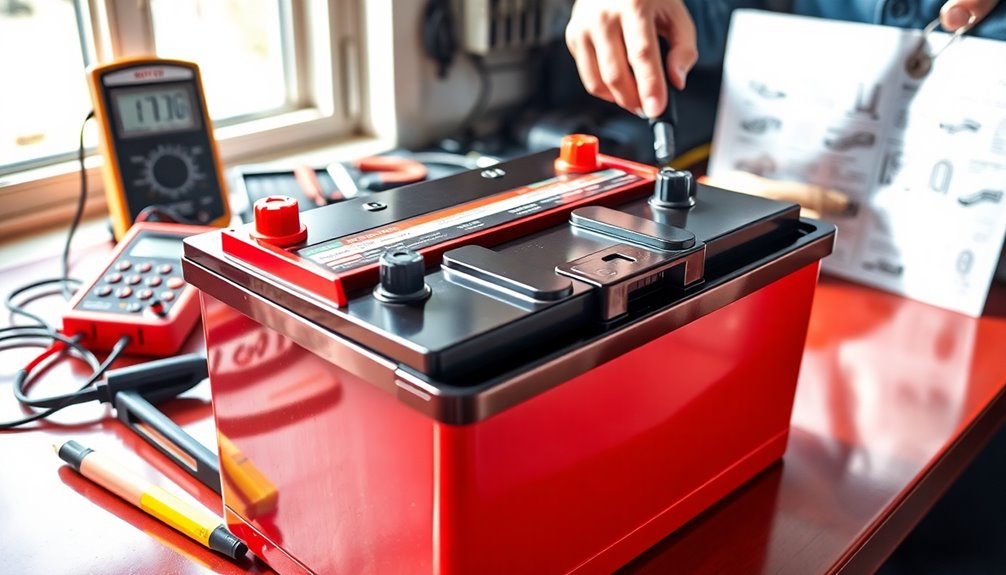
Maintaining your car battery not only helps you avoid unexpected replacements but can also greatly extend its lifespan.
Regular maintenance is key; start by cleaning the battery terminals with a baking soda and water mixture to prevent corrosion.
Check to verify the battery is securely mounted to minimize vibrations that can damage internal components.
Every six months, conduct a voltage test using a multimeter; if your battery's charge is below 80%, recharge it promptly.
Limit short trips to allow your battery to charge properly, as frequent short drives hinder effective charging.
Finally, park in shaded areas or use insulation blankets during extreme temperatures to protect your battery from heat stress and cold weather effects, preventing premature failure.
Frequently Asked Questions
What Maintenance Do Car Batteries Need?
To keep your car battery in top shape, regularly inspect the terminals for corrosion and clean them with a baking soda solution.
Check water levels in non-maintenance-free batteries every six months, adding distilled water as needed.
Make certain the battery is securely mounted and check clamps for vibrations.
Use a multimeter for routine voltage tests twice a year and schedule professional checks annually to catch any issues early and maintain performance.
How Frequently Should a Car Battery Be Replaced?
You should replace your car battery every 3 to 5 years, but it can vary based on your driving habits and local climate.
If you frequently drive short distances or live in extreme temperatures, you might need to replace it sooner.
Keep an eye out for warning signs like slow engine cranks or dashboard lights.
Regular maintenance helps, but it's crucial to stay proactive about replacement to avoid unexpected failures.
Should I Replace a 7 Year Old Car Battery?
You should definitely consider replacing a 7-year-old car battery. At this age, it's likely struggling to hold a charge, which can lead to unexpected failures.
Signs like slow engine cranking or dim headlights indicate it's time for a change. Having it tested for voltage and overall health is a smart move, but replacing it proactively can save you from being stranded, especially in extreme weather.
Don't wait for it to fail!
How Do You Maintain Battery Tips?
To maintain your car battery effectively, start by inspecting the terminals for corrosion and cleaning them with a baking soda and water mixture.
Check the water levels in your non-maintenance-free battery every six months, adding distilled water as needed.
Use a multimeter to test the battery's voltage biannually, and verify it's securely mounted to avoid damage from vibrations.
Finally, schedule annual professional checks to catch any potential issues early.
Conclusion
In summary, keeping your car battery in top shape is essential for your vehicle's health. Did you know that nearly 40% of battery failures occur during extreme weather conditions? By staying on top of routine maintenance and recognizing signs of wear, you can avoid being part of that statistic. Remember, a little care goes a long way in extending your battery's life and ensuring you're not left stranded when you least expect it.






